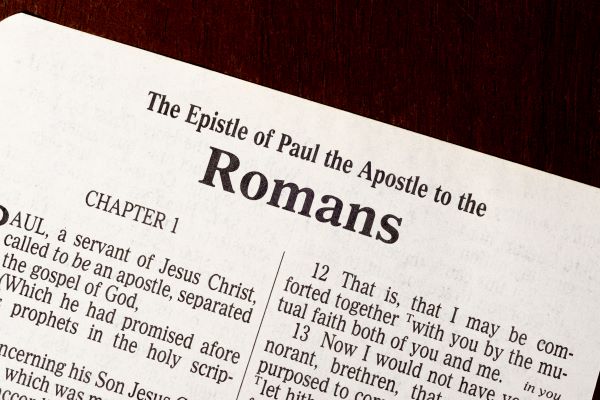Romans 1:2-4
By Terry Cheek Th.D.
McDowell County
Let’s continue our study of Romans. In this article, we are going to look at the Promised Gospel. Paul testifies that God has separated him for preaching the gospel to the gentiles, which God previously promised through His Old Testament prophets (v. 2). Postmodern Christianity tends to separate the Old and New Testaments. Often, we hear the Old Testament referred to as law and the New Testament as gospel, as if there were no law in the New Testament and no gospel in the Old Testament. Paul says from the beginning that the gospel is not new. The first time we hear the gospel in the Old Testament is in the form of a curse. As a result of the Fall, God cursed Adam, Eve, and the serpent. God said that the woman’s seed would crush the serpent’s head, and in the process, the serpent’s seed would bruise the man’s heel. Centuries before Rome crucified Christ on the cross, and He crushed the head of Satan while being bruised for our iniquities, the gospel of Christ was given in the promise of the curse of the enemy. That is the first proclamation of the gospel (Gen. 3:14–19).
Paul, an expert student of the Old Testament, was aware of that, which is why he said that this gospel is what God “promised before through His prophets in the Holy Scriptures.” The “sacred writings” is the actual phrase he uses here. God has not lost confidence in the power of the sacred Scriptures. He has ordained Scripture with the power of the Holy Spirit. He declared to Isaiah, “My word…. shall not return to Me void” (Isa. 55:11). I sincerely believe there is no greater authority than the Word of God. No other source gives me more confidence or possesses more credibility. I am impressed with empirical science when it verifies hypotheses in unique ways. However, nothing is more impressive, exciting, encouraging, or inspiring than finding life’s answers in the pages of Scripture. It annoys me when I see the bumper sticker that says: “God said it, I believe it, that settles it.” We should remove that middle term. If God says it, it is settled, regardless of whether we believe it. There is no higher court of appeal than the voice of God. Therefore, it is necessary for the apostle Paul and anyone defending the gospel to say, “It is found in Scripture.” The Lord Jesus Himself, as He walked with people on the road to Emmaus after His resurrection, “beginning at Moses and all the Prophets” (Luke 24:27), opened up the Old Testament to them, showing and teaching that they should not have been surprised by His resurrection. After leaving, their response was, “Did not our heart burn within us while He talked with us on the road, and while He opened the Scriptures to us?” (Luke 24:32). Our hearts should burn when we experience the power of Scripture authenticating God’s truth.
Paul continues concerning Jesus Christ our Lord (v. 3). In this brief passage, Paul calls Jesus the Son of God, and the Messiah of Israel, which is what the term Christ means. Do you realize Jesus Christ is not His name? Jesus is His name. His full name would be Jesus bar Joseph or Jesus of Nazareth. The word Christ is His title, and the title Jesus Christ means “Jesus Christos,” or “Jesus Messiah.” God’s Son is the Christ, who was born of the seed of David according to the flesh (v. 3). This is important because the Old Testament prophecies of the coming Messiah said He would be from the lineage of David. Luke gives us a great deal of information about the nativity of Jesus, bringing us to Bethlehem, the city of David because the Old Testament tells us the Messiah would be born from the loins of David. He was to be David’s Son, yet at the same time David’s Lord. Paul reminds the church that Jesus Christ was descended from David, “according to the flesh.” Jesus being David’s descendent is another essential phrase in the New Testament.
The Greek uses two different words to refer to the physical nature of our humanity. And occasionally, we seek them used interchangeably. The more common word for body, or the physical makeup of people, is the word sōma. When psychiatrists and psychologists talk about psychosomatic illnesses, they refer to diseases that have their genesis in some aspect of one’s psychology. It is not that the conditions are not actual—they are honest and affect the sōma, the body. In addition to the term sōma, there is the word sarx, which also refers to the physical dimension of human life. Paul reminds us elsewhere that he did not meet Jesus in the flesh. He met Him in the power of His resurrection on the road to Damascus, but he never met Him personally during His incarnation. That is what Paul is getting at here. Elsewhere the term sarx is loaded with theological content. Sarx is being used to describe our fallen, corrupt nature. When Jesus said, “That which is born of the flesh is flesh, and that which is born of the Spirit is spirit” (John 3:6), or, “The flesh profits nothing” (John 6:63), He was talking about our fallen condition, not about our skin and bones. He was talking about our corrupt nature, which Scripture frequently sets in contrast to the spirit. There is a war taking place inside the Christian life, a war between flesh and spirit. We still battle with the flesh, but the battle is not with our physical body. It may involve our physical body, but the struggle is between the flesh and the spirit, between the old man, who is fallen and corrupt, and the regenerated person, who is now living by the Spirit of God.
We must also understand that Paul does not deny the virgin birth. Christ did not receive His deity from Mary or Joseph. He brought His deity with Him from heaven. Jesus was born of the seed of David according to the flesh and declared to be the Son of God. Paul summarizes the whole life and work of Jesus here: He is “born of the seed of David” and declared to be the Son of God with power (v. 4). When God the Holy Spirit raised the corpse of Jesus from the tomb, God was announcing to the world the sonship of Jesus. By what evidence do we believe that Jesus is the Son of God? By the testimony of God, who has declared Him to be His Son through the power of the resurrection. Paul debated with the philosophers on Mars Hill at the Areopagus, where a monument stood to an unknown god. “These times of ignorance God overlooked, but now commands all men everywhere to repent, because He has appointed a day on which He will judge the world in righteousness by the Man whom He has ordained. He has given assurance of this to all by raising Him from the dead” (Acts 17:30–31). As we will see later in Romans 1, Paul labors the point that God has made Himself known so clearly to every human being that nobody has an excuse for denying Him. When Jesus is declared God’s Son through the power of the resurrection, that declaration may be all we ever get. We could be like Thomas and say, “Unless I see in His hands the print of the nails, and put my finger into the print of the nails, and put my hand into His side, I will not believe” (John 20:25). We do not want to stand before God on judgment day having denied Jesus Christ because God has made known the reality of Jesus through the power of the resurrection. That is the appeal Paul is making here. He says, “I’m not the one declaring to you that Jesus is the Son of God. God has declared that to you by the Holy Spirit is the power of the resurrection.”
Works Cited
Holy Bible, King James Version. Thomas Nelson publisher. Kindle Edition
Holy Bible, English Standard Version. Kindle Edition
Sproul, R.C… Romans: An Expositional Commentary. Ligonier Ministries. Kindle Edition.
John Phillips, Exploring Romans, Kregel Publishing, 2002
________________________________________
Terry is the Executive Director and broadcaster of The Inspiring Word media ministry
You can contact Terry by email at theinspiringword@gmail.com
Or by visiting www.theinspiringword.org
Read more from Terry Cheek here.
________________________________________








